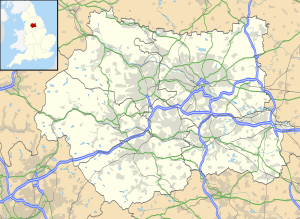Wakefield Castle facts for kids
Quick facts for kids Wakefield Castle |
|
|---|---|
| Thornes Park, Wakefield, West Yorkshire | |

Grass covered earthwork and tree covered motte at Lowe Hill
|
|
| Coordinates | 53°40′21″N 1°30′26″W / 53.672623°N 1.507191°W |
| Site information | |
| Owner | City of Wakefield MDC |
| Condition | motte |
Wakefield Castle, also known as Lowe Hill or Lawe Hill, was a castle built a long time ago in the 12th century. It stood on a hill north of the River Calder in Wakefield, England. The name "Lowe Hill" comes from an old Anglo-Saxon word, hlaew. This word means a mound or a pile of stones, which might have been a burial mound.
The hill was a good spot for a fort. It was about a quarter-mile from the river. Flat, swampy land separated it from the town.
Contents
Building Wakefield Castle
William de Warenne, 3rd Earl of Surrey likely started building this castle. It was a special type of castle called a motte and bailey structure. This design was very common for castles back then.
What is a Motte and Bailey Castle?
A motte and bailey castle has two main parts:
- A motte is a large, tall mound of earth. At Wakefield Castle, this mound was about 40 feet high. It had a flat top, about 50 feet across.
- A bailey is a fenced-in area next to the motte. Wakefield Castle had two baileys.
To build the motte, workers dug a deep ditch. This ditch was about six feet deep and 40 feet wide. They used the earth they dug out to build the tall motte.
Inside the Castle Walls
The baileys were protected by strong timber fences called palisades. These areas were busy places. They held stables for horses, workshops for making and fixing things, and sleeping areas for the soldiers who guarded the castle.
The Castle's Later Years
In 1318, Wakefield Castle and nearby Sandal Castle were given to Thomas, Earl of Lancaster. Later, in 1324, King Edward II put Richard Moseley in charge of both castles.
Why Was the Castle Destroyed?
No one knows exactly when Wakefield Castle was destroyed. However, a very strong storm in 1330 caused a lot of damage in Wakefield. This "great gale" might have been the reason the castle fell apart.
In 1953, people dug up parts of the castle site. They found clues that suggest the castle might have been an "adulterine castle." This means it was built without official permission from the king. It seems the castle was never fully finished and was left abandoned.
Lowe Hill's Role in History
Lowe Hill, where the castle stood, was used for other important things too. In July 1558, a beacon was lit on the hill. A beacon is a signal fire. This fire was lit to warn people that the Spanish Armada had been seen. The Spanish Armada was a large fleet of ships from Spain. It was spotted off The Lizard in Cornwall, far to the south.
What Remains Today?
Today, not much is left of Wakefield Castle. It is a Scheduled Ancient Monument, which means it's an important historical site protected by law. You can find it in Thornes Park. The main thing that remains is the motte, the large earth mound, which is now covered in trees.
 | Ernest Everett Just |
 | Mary Jackson |
 | Emmett Chappelle |
 | Marie Maynard Daly |


